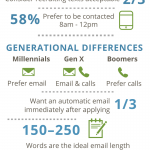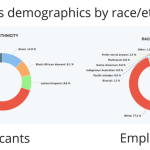How To Show A Hiring Manager You’re In High Demand
Supply and demand is a simple formula. When a product or service is in high demand, consumers desire it more. Whether it’s people lining up around the block to buy a new gadget or a restaurant with a huge waiting list, the fact that lots of people are attracted to something gives us reason to believe it’s worth checking out.
The job market is like any other market in this respect. Here’s how to turn it to your advantage.
How Demand Can Help Your Job Hunt
When employers are assessing which candidates to hire, they too can be influenced by signals of approval from other people.
Psychologist Robert Caldini calls this phenomenon “social proof” and explains that human beings are “naturally inclined to follow the lead of similar others.”
So in employment terms, this means that hiring managers are likely to be more interested in a candidate who’s getting attention from rival firms. If other companies are looking to hire you, that may back up a prospective employer’s assumptions that you’re a strong candidate, boosting their confidence that you’re a good bet.
What’s more, if a hiring manager has reason to worry that a rival company may snap you up, they’ll be more eager to speed you through the hiring process and take you off the market before anyone else can. Finally, being in high demand can also give you more power to negotiate a better compensation package when it comes to the offer stage.
These steps can help you create this impression strategically yet tactfully—because done wrong, it can make you seem arrogant or uninterested, and backfire.
1. Plant The Seed
The first step toward convincing recruiters that you’re in demand is to project some signals during the earliest stages of your contact. During your initial phone or email conversation, you should subtly reference any interest that you’re generating in the job market.
Mention just one or two employers that you’re in talks with simultaneously, even if you’ve only just begun the process with them, but don’t overdo it. Name-dropping too many firms at such an early stage might seem like you’re making it up. Once you’ve started to build some rapport with the recruiter, say something like this:
Just to be transparent, I should let you know that my resume is already under review at Company X, and I’ve been asked to interview with Company Y.
Don’t give away too much information at this stage, as you don’t want to oversell it or seem as though you’re bragging. Part of the motivation, after all, is indeed simple transparency: If you genuinely are being considered by other companies, it’s in your interest as much as theirs to keep things moving. It’s just about making the recruiter aware of your progress to avoid any duplication issues.
2. Gently Increase The Sense Of Urgency
As a candidate, it’s hugely beneficial to create a sense of urgency among the people who are reviewing your application. If your resume isn’t processed by the key decision-makers quickly enough, you may find that another candidate bags the job before the hiring manager even sees your resume. So when competition is high, it pays to get your foot in the door as early as possible.
If you feel that your application process is dragging, then an email chaser reminding the recruiter of your in-demand status can help to move things along. But that message has to be tactful, too, in order to maintain good relationships and avoid seeming pushy. Try something like this:
Hi [your contact],
Hope you’re well. I just wanted to check on the progress of my application as we haven’t spoken in a little while.
I’m still really keen on the role but I have a final interview for a similar position with Company X this week, and if all goes well, it would be difficult for me to turn down.
Your role is still my first choice, so I could make myself available for an interview anytime this week if the hiring manager wants to see me.
Kind regards,
[your name]
This email is polite yet to the point. It stresses the candidate’s interest in the recruiter’s role but also makes it clear that the candidate may be taken off the market if the recruiter doesn’t act fast.
Sharing this information straightforwardly may feel a little uncomfortable, but it isn’t rude—it will simply put pressure on the recruiter because they now risk losing a good candidate and letting the hiring manager down.
If you are indeed a good fit for the role, then this should be enough to persuade the recruiter to highlight your resume to the hiring manager and push them to interview you promptly. (And if that doesn’t happen, you may still have gained valuable insight into your relative strengths and weaknesses in the eyes of some prospective employers—maybe you weren’t as competitive for the role as you’d have hoped, but that’s useful to find out.)
Is It Ever Okay To Lie About Your Demand?
You will probably get away with small white lies or exaggerations about your demand, but be careful not to overstep the mark. If you tell a fib about having some vague interest from another company, then it’s unlikely that any recruiter will contest that information.
However, if you go as far as fabricating a high-salaried offer from a rival employer in an attempt to negotiate a higher compensation package, this is something most recruiters will probably investigate. And even if they don’t, your integrity is absolutely crucial to your employability and overall professional success—don’t compromise it for short-term strategic gains.
Ultimately though, if you have a well-tailored resume and a proactive job hunting approach, you shouldn’t need to worry. This strategy should be enough to generate a few early conversations with employers, which you can then use to prove the demand for your skills.
Andrew Fennell is an experienced recruiter, founder of London CV writing service StandOut CV and author of The Ultimate CV Writing Guide.
Fast Company , Read Full Story
(18)













